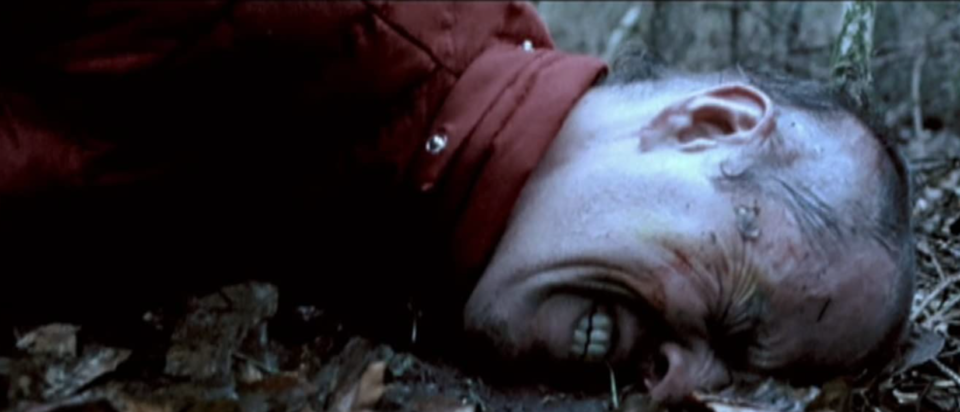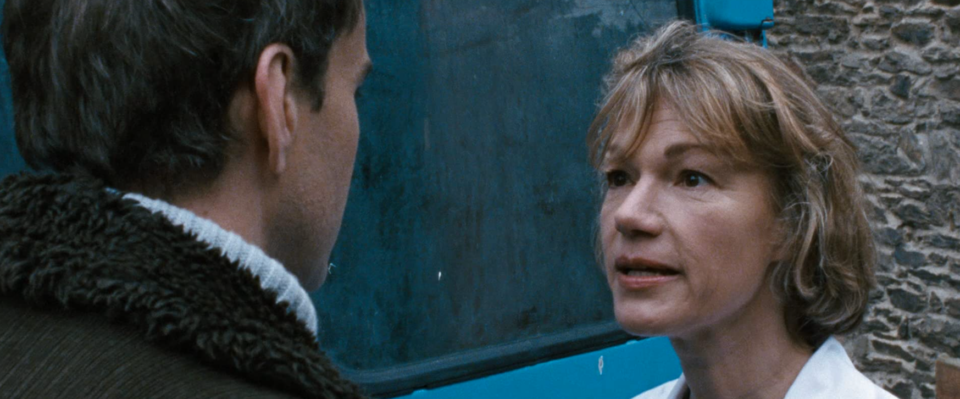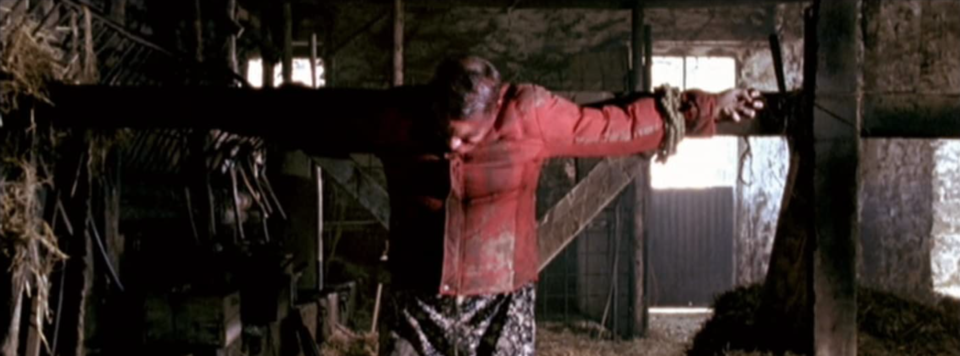‘Calvaire’ and Horror in the Absence of a Matriarch [Matriarchy Rising]

Can a film be feminist without centering women? At first glance, this Belgian film about a town devoid of women might seem like a strange choice for a column dedicated to female-led systems of power in horror. Fabrice du Welz’s Calvaire follows Marc (Laurent Lucas), a traveling songwriter who becomes stranded in the rural countryside and takes refuge with a local innkeeper named Bartel (Jackie Berroyer). Still reeling from the departure of his wife Gloria, Bartel puts Marc through a horrifying ordeal and forces him to take the woman’s place in his life.
The entire story contains only two notable female roles, but sometimes it’s the absence of something that reveals its true impact. Despite its multinational roots, Calvaire is considered a part of the French Extremity subgenre. However, if we swap the gender identity of the central character, Calvaire feels more like a traditional horror narrative. Its power lies in placing a male character in the types of submissive and victimizing roles that we have collectively accepted as a part of female life.
When we first meet Marc, he is preparing for his performance. As a traveling singer, he applies stage makeup in front of a mirror and dons a caped costume to perform rather cheesy love songs for a group of nursing home residents. After the show, two different women sexually harass him. An elderly admirer takes his hand and places it between her legs while he removes his makeup backstage. Marc reacts with restrained anger and she berates herself for misinterpreting his performance. As he is leaving, this woman watches from a window while a younger nurse desperately clings to him under the guise of a goodbye hug and begs him to stay. She hands him an envelope containing his performance fee and what we later learn are semi-nude photos of herself intended to entice him. Marc easily extracts himself from the awkward situation and continues on his way.
Swapping the gender identities of victim and predator in these situations makes an important point about embedded power dynamics that pervade society. While these are both relatively minor infractions and seem to stem from genuine affection for the likable man, they are still unwanted sexual advances occurring in Marc’s place of work. Were we to reverse the gender identities of each altercation, the beginning of the film would feel much darker. A woman in Marc’s place might be tempted to laugh off groping to maintain the dignity of the offender. Consider also a man prolonging an embrace with a contracted employee, or even initiating a hug in the first place. This would be a reportable offense, especially considering it occurs just moments before payment is delivered. A female-identifying performer might feel compelled to accept these advances to secure further bookings or to avoid a reputation for being “difficult.”

Unfortunately, these stories of workplace sexual harassment are common both onscreen and in everyday life. We are well aware of the potential for harm, but we never fear for Marc’s safety during his time at the assisted living facility. As a tall and assertive man, he always seems to have more power and it’s not until he has trouble starting his van that he truly feels helpless. Moreover, we’re reluctant to see these women as sexual predators. They feel more like lonely women simply hoping to spark a relationship with an attractive man. This stands in sharp comparison to the village Marc will soon visit and sets the tone for a film in which he will be continuously abused and attacked.
Du Welz has cited both Psycho (1960) and The Texas Chain Saw Massacre (1974) as key inspirations for Calvaire, and the parallels can be seen right away. Both films center on travelers who fall victim to families driven to depravity in the absence of a matriarch. Hitchcock’s film follows a young man haunted by the ghost of his domineering mother. He routinely dresses in her clothes and kills those he believes would offend her in a delusional attempt to prolong the abuse she inflicted before her death.
Hooper’s film centers around a rural family who resorts to cannibalism when the nearby slaughterhouse closes. With no living matriarch, one of the children (the chainsaw-toting Leatherface) dresses in matronly clothes and prepares a dinner of human flesh to maintain a twisted ideal of domestic normality. Both films feature the corpses of mother figures preserved somewhere in the family home, their maternal absence looming over their descendants like a dark cloud.
In Calvaire, Marc stumbles into a similar situation when his van stalls on the road and follows a man named Boris (Jean-Luc Couchard) to a nearby inn. We sense the possessiveness of the innkeeper, a lonely man named Bartel, the next morning when he asks Marc not to go into the village. As we later find out, he’s worried about his neighbors becoming jealous of his new houseguest. Over an uncomfortable dinner, Bartel talks about his wife Gloria, a singer, who left some time ago. Bartel, a comedian, tells Marc a joke and then persuades him to sing.
Though Marc delivers the song in a clear baritone, this sparks a connection for the innkeeper between the masculine performer and his missing wife. The next morning, Marc discovers that Bartel has not been attempting to repair the van. Instead, he removed the battery and found the nurse’s nudes. This combined with Marc’s song seems to push Bartel over the edge. Perhaps he’s worried that Marc will leave him like Gloria once did or maybe he sees the victimizing photos as an invitation to dominate Marc as well. He knocks the man out and begins to treat him as Gloria.

When Marc wakes up, he is wearing a printed sundress and tied to a chair. Struggling, he sobs while Bartel removes his hair with blunt clippers. This scene is a direct parallel to the opening shots of Marc applying makeup. Both scenes represent a transformation, but the results are vastly different. As Marc applies stage makeup, he becomes his ideal self, even wearing a cape with his name embroidered on it. He has full control of both his appearance and his identity and uses them to create a consensual relationship with his audience. Bartel has taken all of Marc’s autonomy. The clippers don’t change much about his appearance, but they serve to transform him from a human being into an object. From this moment on, everyone Marc encounters in Calvaire will see him as Gloria.
Bartel likely regards his first night with “Gloria” as a romantic occasion. He puts on a silk robe and primps in front of a mirror before getting into bed next to a restrained and moaning Marc. This scene also directly parallels an earlier scene in which Marc encounters villagers for the first time. While wandering the countryside, he approaches a barn in which a group of men surrounds a lowing calf. One man embraces the animal from behind and engages in bestiality. Bartel uses the same position to embrace Marc and his cries sound frighteningly like those made by the calf as it is assaulted.
Bartel has now transformed Marc into an animal who exists only for his pleasure. The next morning, he ties Marc to a tractor and sets out to find a Christmas tree. Though Marc is clearly miserable, Bartel rambles about his excitement. “Gloria” will decorate the tree and they’ll have the best holiday ever! In the same jovial tone, he warns “Gloria” that if she ever tries to leave him again, he’ll split her in two like a log, an upsetting threat considering the events of the previous night.
These two sequences clearly show what Bartel looks for in a wife. He does not want an equal partner who will help him manage the inn and create a life they can share. He wants someone to fill his bed, laugh at his jokes, decorate his tree, and most of all, never leave him. Bartel’s desire for a wife is similar to the concept of a tradwife. This “traditional wife” exists to make life pleasant for her husband. In exchange for financial support and protection, she transforms herself into the ideal romantic partner, fully devoting herself to his needs regardless of her own. It seems Bartel is so indifferent to the individuality of his tradwife that she could be anyone. So long as there is someone to dominate and call Gloria, he will be happy.
As punishment for trying to escape, Bartel nails Marc’s hands to beams resembling a cross. As the film’s title references Calvary, the hill on which Christ was crucified, the sacrificial reference could hardly be more clear. With the perversion of the holy crucifixion, Du Welz draws a direct line between bodily sacrifice on the cross and the demands of a domineering husband. Many followers of Judeo-Christian ideology use scripture to justify expecting women to sacrifice their own autonomy for the comfort of the men in their lives. The gospel tells us that Jesus chose to redeem the sins of humanity, but Marc has made no such choice. Not only is he being punished for the imagined sins of someone he has never met, but that sin amounts to a woman wanting to leave an unhappy marriage.
Suppose this was the actual Gloria. Would we be tempted to minimize Bartel’s actions as those of an abusive husband; extreme, but otherwise common? Spousal abuse is so much a part of our everyday life that we refer to white, sleeveless undershirts as “wife beaters.” By placing a male character in the same predicament, we can fully see the harm this type of subjugation places on anyone. The film’s extremity comes from watching a man dehumanized and abused by other men. We’ve been conditioned to view men as the automatic sources of power in any relationship and when we watch a male character occupy a submissive role against his will, we become so uncomfortable that we can barely stand to watch.

Marc does not fare any better with the villagers. A scene in the village pub reveals a town devoid of women and the remaining men seem to accept Bartel’s assertion that “his Gloria” has returned. What follows is a bizarre dance sequence in which one villager plays an aggressive tune on the piano while the rest pair up and mirror each other in jerky motions. Facing each other, they have clearly partnered off, but refuse to touch each other in any way. They are replicating gendered-dance patterns with no one wanting to fill the role of the submissive partner. While it’s obviously possible to find companionship and even love in a single-gendered community, this does not seem to be what the villagers want. The oddity of this scene is not caused by a lack of women, it’s caused by a lack of humanity.
Hoping to recapture “Gloria,” they descend on the inn and interrupt a bizarre Christmas Eve celebration. Marc is still being held prisoner, and Boris has joined the festivities with a calf he’s claiming is his dog “Bella.” He has taken Bartel’s earlier advice to “be obstinate” and refuses to see the calf as anything other than what he wants her to be. Who she actually is does not matter to him at all and it’s more important for Boris to see himself as a man with a dog named Bella than for the animal to be happy and safe. The villagers invade the inn and demand at once what Bartel has been forcing on Marc for the past few days: sex and singing.
Another villager seems to have romantic feelings for “Gloria” and we begin to wonder what actually happened to the innkeeper’s wife. Perhaps she was unfaithful and Bartel killed her in a jealous rage. Perhaps she was assaulted by this villager (hardly out of line with what we know about this community) and was then treated as “damaged goods.” Hopefully, she grew tired of living with men who would never see her as fully human and left on her own. Regardless of why, everyone in the town would surely regard Gloria’s absence as her own fault. When Marc finally escapes, he wanders the woods before stumbling upon a large crucifix. When a villager begins sinking into a bog, Marc returns to his attacker to offer comfort. Despite everything he’s been through, this internalized desire to please has been so deeply ingrained in him that he abandons his own escape.
We never find out anything about Gloria except that she can sing. She is an idea in the film; an avatar standing for all women. Gloria is a woman who will make a man feel like a man. She is a woman who will fill the role assigned to her and not ask questions. If she does, she will be severely punished. She is the target of possessive desire yet even those who claim to love her still see her as less than human. Marc has been transformed by this ordeal. Through Bartel’s dehumanizing idea of love, he has been treated as an object designed for comfort and entertainment, a necessary part of ideal domestic life.
Calvaire will hopefully have a transformative effect on the audience as well. By identifying a person in an abusive relationship as human before we identify them as female, we can clearly see the inhuman cruelty we project onto women every day.
Categorized: Editorials Matriarchy Rising News
